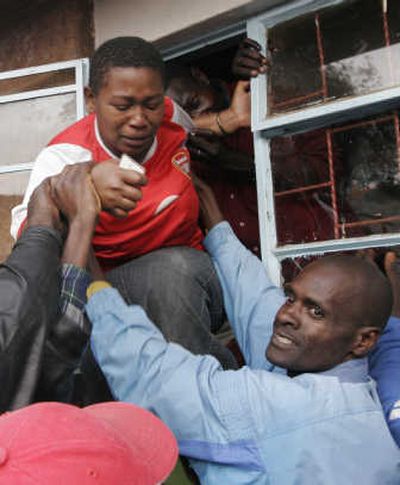Election turnout high in major test of Kenya freedom

NAIROBI, Kenya – Kenya’s democracy faced a major test Thursday as 14 million people voted in presidential and parliamentary elections marked by delays, pre-election violence and opposition claims of vote fraud.
But the turnout was high as many Kenyans rose before dawn, walked miles to the nearest polling station and stood for hours in line to vote.
The election, too close to call, could see an incumbent president voted out for the first time in Kenya, despite an era of economic growth and political stability under President Mwai Kibaki, 76.
Kenya is situated in one of Africa’s most volatile and troubled regions, yet it has one of the continent’s most vibrant democracies.
Judith Atieno, 38, arrived at 5 a.m. at St. Peter’s Cleavers polling station in downtown Nairobi to cast her ballot. “I am sure with my single vote things can change greatly,” she said. “That’s why I had to wake at 4 a.m., walk a distance of about 6.2 miles, all because I am sure my vote can make a change.”
Kibaki has lagged behind his strongest challenger, Raila Odinga, 62, leader of the Orange Democratic Movement, in opinion polls this past year. Recent polls, however, showed a difference so close that it fell within the margin of error.
The two candidates have run on similar platforms: free education, economic development and the building of roads and schools.
To monitor the election, 30,000 local and international observers were deployed. The chief observer for the European Union, Alexander Graf Lambsdorff, said the situation was chaotic in places, but he had seen no evidence of fraud before counting began.
“There are some technical problems, but what is pleasing is that people are turning out to vote in large numbers and are doing so peacefully and patiently,” he said.
Odinga found his name was missing from the voter rolls when he attempted to cast his ballot early Thursday. He told journalists it was part of an effort by the government to rig the vote.
Kibaki’s Party of National Unity rejected the claim as “divisive and false,” saying his name was on the rolls, but he had gone to the wrong polling place.
Kibaki’s National Rainbow Coalition, or NARC, defeated the ruling Kenya African National Union in 2002 elections, ending four decades of KANU rule. But critics say Kibaki failed to deliver on his promise to fight corruption and instead entrenched a political elite from his own Kikuyu tribe known as the Mount Kenya Mafia. NARC was dissolved in 2006, and Kibaki set up the Party of National Unity in September.
Tensions were high in the lead-up to the election, as Odinga accused the government of preparing to rig the vote. On the eve of elections, Kibaki denied accusations.
More than 70 people died in pre-election violence.
Odinga’s supporters in Kibera, a slum area, set up roadblocks and checked the trunks of cars during voting Thursday, looking for smuggled ballot papers.